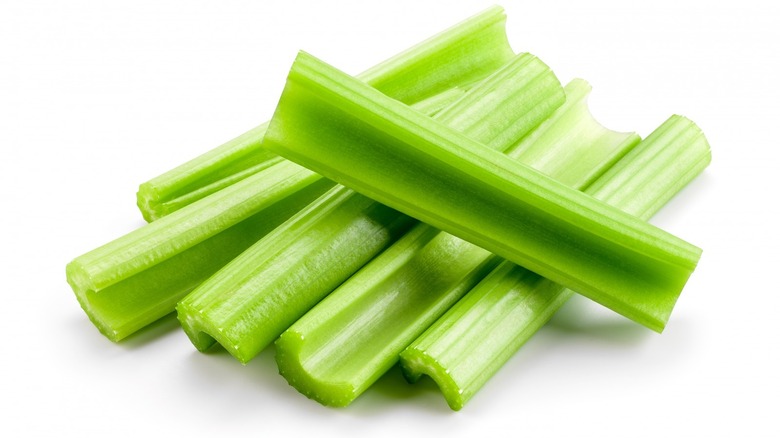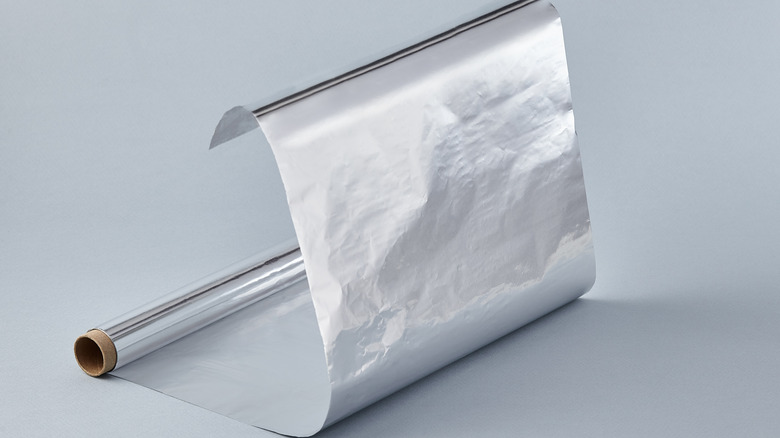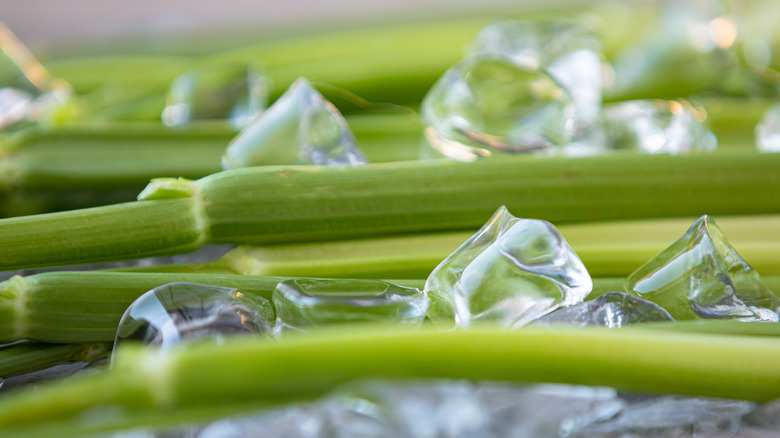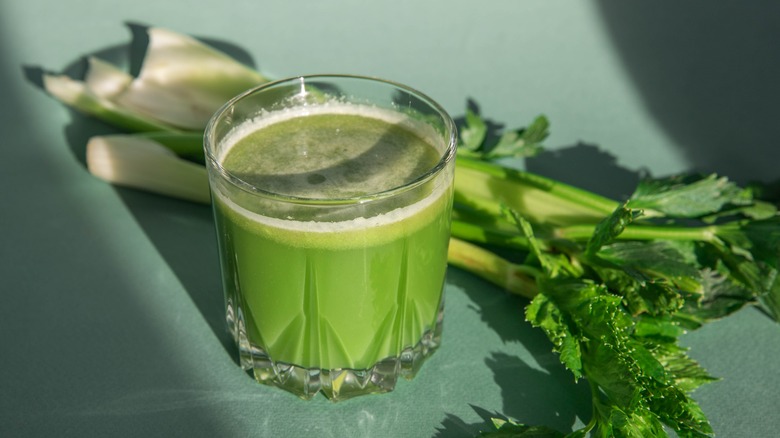Here's How To Keep Celery Fresh
Celery is the crunch in your tuna salad, the log in the nostalgic childhood treat ants on a log, and one of the three main ingredients in a mirepoix. It even made headlines, thanks to celebs like Jennifer Aniston and Pharrell Williams when celery juice became popular — remember that trend? Loved for its satisfyingly crunchy texture and a laundry list of health benefits, it's an anti-inflammatory, digestion-aiding, low-calorie veggie that's high in antioxidants.
But if your recipes just call for just a stick or two, how do you store the rest of the head to keep it fresh for weeks to come? It can go bad in a hurry if not stored properly. One commonly known way to store celery is to cut it and store it in water, which can give it a life span of two weeks, per Allrecipes. But celery can last much longer, up to four weeks, if stored using this one unusual trick.
Wrap celery in aluminum foil to extend its life
Have you ever seen green sadness? In a video for eHow, Farm-to-table chef Teca Thompson showed YouTube viewers what it looks like in the form of expired celery. Limp, slightly slimy, and rubbery, it has lost moisture and gained discoloration. It's basically a floppy shell of its former crispy glory. In a piece for Penn State's College of Agricultural Sciences, professor of vegetable crops Peter Ferretti explained that celery and many other kinds of produce wilt due to the natural release of ethylene gas, which causes them to ripen. The gas also turns celery, broccoli, kale, and other greens yellow. Among the biggest emitters of ethylene are apples, which ripen surrounding fruits faster. So you probably want to keep it away from your celery.
You also don't want to keep the celery in a plastic bag, which will prevent the ethylene gas from escaping and shorten the veggie's shelf life. According to Cook's Illustrated, the best way to let the ethylene escape while also keeping moisture in is to wrap the whole head of celery in aluminum foil and store it in the fridge. Don't make it too tight for ethylene to escape, but it shouldn't be too loose to keep in moisture.
You can also store celery in the freezer
So, we've learned that wrapping celery in aluminum foil and storing it properly can extend its shelf life, but how does freezing impact the vegetable? Luckily for those who enjoy freezing food scraps for homemade vegetable stock, it's perfectly OK to store your celery in the freezer — but you'll want to prep it before you do.
Before you freeze celery, it's important to blanch it to ensure it maintains its taste and crunch. But what exactly is blanching, and how do you do it? According to Food Network, blanching is "the process by which foods (usually fruits and vegetables) are briefly submerged in boiling water and then immediately cooled to stop further cooking." Since it is boiled for just a short time, the item is still considered raw, so the celery will be nice and crisp. Blanching before freezing prevents the natural enzymes in the vegetable from degrading in quality while sitting in the freezing temperatures. So, if you need to store that leftover celery, feel free to do so, knowing that it will last with a quick blanch beforehand. If you'd prefer to use it up immediately, add it to a delicious Alex Guarnaschelli green salad.
Use up your leftover celery by juicing it
If you still have several bunches of celery in the fridge you want to use — but you're tired of soups and can't bear the thought of another tuna salad — you could always whip up a batch of celery juice.
Not only is celery juice a refreshing, non-sweet alternative to fruit juice, but, according to a medically reviewed article by Insider, it's also one of the most nutritious ways to consume celery. The rationale is that it allows more of the fibrous, stringy vegetable to be digested, which results in higher absorption of its vitamins and minerals. Another reason to juice your leftover celery is that it contains about 95% water, so drinking it is a great way to hydrate. Lastly, since it's low in sugar, it makes the ideal beverage for those aiming to reduce sugar cravings. However, it's important to note that the juicing process removes much of the fiber, because the pulp is filtered out by the machine.
The positives don't stop there. As reported by BBC Good Food, consuming celery may help boost your gut health by protecting you from stomach ulcers and preserving mucus in your digestive tract. And with February being American Heart Month, it's worth noting that celery contains phthalide, which aids blood flow throughout the body.



